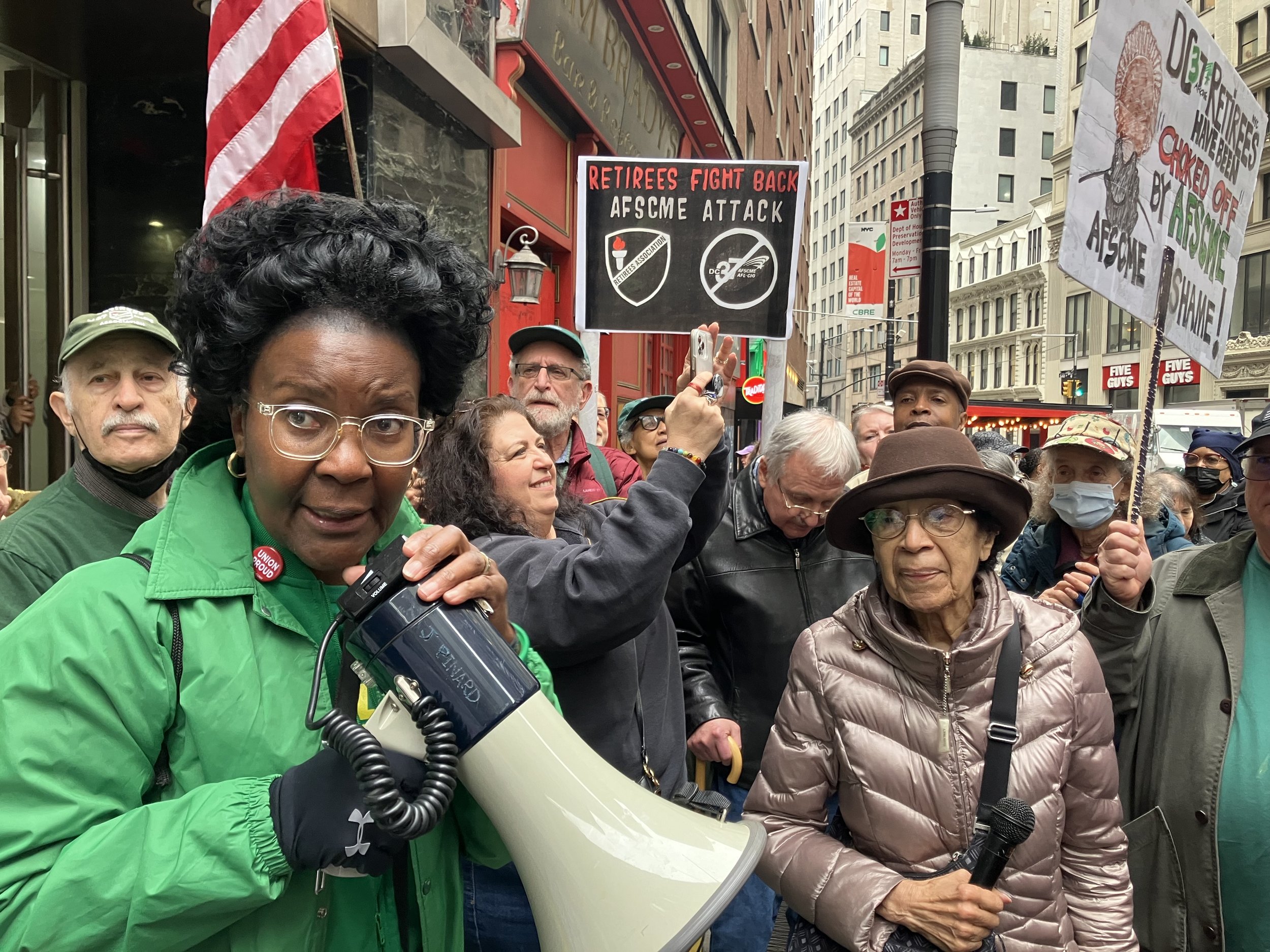Confronting Labor’s Role in the ‘Bastardization of Medicare’
New York City municipal retirees rally outside the offices of the DC 37 Retirees Association last month, after the parent union swooped in and suspended the group’s officers who were fighting back against Medicare Advantage. Photo/Joe Maniscalco
By Joe Maniscalco
This year’s Labor Notes Conference in Chicago featured workshops reflecting labor’s support for single payer health care. What could not be ignored, however, are those powerful forces within the house of labor itself who not only oppose single payer — but who are actively pushing the privatization of traditional Medicare through so-called Medicare Advantage plans.
Or as one prominent single payer advocate Work-Bites spoke to called it — the “bastardization of Medicare.”
“I think it comes from unions not being confident that they can really deliver for their members anymore through fighting — and so they take shortcuts,” author and University of Chicago history professor Gabriel Winant told Work-Bites.
Winant moderated a Labor Notes workshop called, “The Health Care System We Need And The Labor Movement That Can Win It.” Organizers dubbed another workshop, "Increase Worker Power Through Medicare For All.”
Municipal retirees across the country being pushed into profit-driven Medicare Advantage plans could have used a workshop called “How To Hold On To The Medicare You Already Have.”
“Think when the labor movement is growing and it’s on the offensive, and workers themselves feel they have some agency and initiative in building their union, strengthening their union, and growing their union,” Winant added. “Then leadership is gonna start to understand you don’t have to desperately hoard what you have and cut deals like that.”
Following her Labor Notes workshop, Rose Roach, national coordinator at the Labor Campaign for Single Payer, pointed out how, “On the Medicare Advantage front, unions are between a rock and a hard place because this is, of course, about money and what’s affordable.”
“Whether that’s within the context of an individual’s retirement fixed income, a business’ revenue base, or a union trust fund — what’s affordable on the front end, meaning the cost of the premium,” she said. “Problem is, the cost of the premium is only one piece of the economic pie when it comes to health insurance, especially Advantage plans. Truth is some union leaders aren't fully aware of the disadvantages of Medicare Advantage while other union funds gain financial benefits from marketing Advantage plans.”
Regardless of any compromises that union might have to make regarding benefits for their retired members, Rose added, “all unions ought to take a stand to oppose the increasing privatization of Medicare, which will adversely affect all working people.”
David Van Deusen, former head of Vermont AFL-CIO and author of the new book, “Insurgent Labor: The Vermont AFL-CIO 2017-2023” was less diplomatic in his assessment of union leaders backing privatization — for whatever reason.
“There is no reality where the right choice is taking a good working public benefit and privatizing,” Van Deusen told Work-Bites ahead of this year’s Labor Notes Conference. “That is at best misguided. At worst, that is a form of treason. We need to fight for public ownership over programs and benefits and major aspects of our society — not the opposite.”
In addition to the well-documented prior authorizations, narrowing provider pools, and outright denials of care, it’s estimated that U.S. taxpayers are paying as much as $156 billion annually in Medicare Advantage overcharging — or “upcoming.”
Sean Petty is a registered nurse who sees basic corruption at the heart of New York City’s campaign to drive 250,000 municipal retirees into a profit-driven Medicare Advantage plan — all with the zealous support of three of the most powerful union leaders in town.
“The bottom line is that there is profound lack of democracy in most of our unions, and nowhere is that more true than in the New York City public sector,” Petty told Work-Bites. “And that for decades and decades that has grown more and more severe to where most agreements of any consequence that happen between the city and New York City unions only involve a small group of people — between the mayor and his staff, and a small group union leaders across the city. So, you know, that dynamic is going to result in a number of casually corrupt relationships.”
According to Rose, “Union” isn’t about any single term or condition of employment — or at least it shouldn’t be.
“It’s about the power of the collective voice to confront the corporate and political bosses and make it abundantly clear that labor creates all wealth and therefore the wealth should not be concentrated into the hands of the few, the corporate bosses, it should be shared with those who created it,” she said.
Judy Sheridan Gonzalez, Bronx ER nurse and former head of the New York State Nurses Association [NYSNA], sees the “seeds of revolt” against the current for-profit system among union members in the ranks of retirees who “militantly oppose the privatization of Medicare.”
“This bastardization of Medicare, known as Medicare Advantage, promises relief to retirees that would theoretically fill the gaps in coverage with standard Medicare (which was never a panacea—it was a partial concession),” she told Work-Bites. “Do the math: If no profit is generated with standard Medicare, and Medicare Advantage plans that take that same government money, AND generate profits to these private insurers, offer this Medicare Advantage alternative, how could they possibly ultimately provide superior care when they are sifting off millions of dollars and pocketing this largesse? Many union retirees who previously received additional insurance negotiated in contracts to fill the gaps in Medicare see through this scam and have organized against official union leaders who are, sadly, not listening.”

